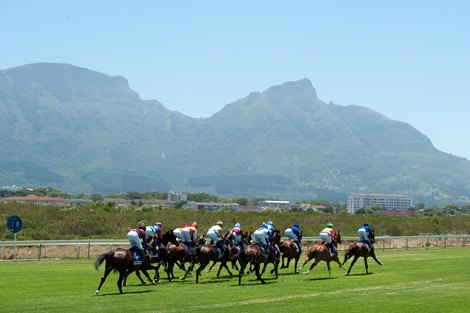An upswing in confidence about a rejuvenation of racing in South Africa has trainers considering returning to the Australian yearling market for the first time in years.
Mike de Kock and his clients have been supporting the Australian yearling market in recent years, but those horses—including valuable stakes winner Letsbefrankbaby—have been trained in Victoria by his son Mathew and Robbie Griffiths.
His South African training peers, however, have largely been unsighted at the Australian sales, hindered by a weak exchange rate for the rand, which has also been exacerbated by the turbo-charged value of Australian bloodstock, making it increasingly difficult for them to compete.
But a renewed confidence in the local racing industry could prompt a group of South Africa’s owners and trainers to once again use Australia as a source of young horses to supplement its homebred stock.
The chairman of Cape Racing, Greg Bortz has been an instrumental figure in a coordinated investment to lift the profile of Thoroughbred racing in South Africa.
It includes taking over Cape Racing in partnership with online wagering company Hollywoodbets and in the soon-to-be rubber-stamped acquisition of Gold Circle, the operator of racing in the province of KwaZulu-Natal where Durban’s racecourse Greyville is based.
“We’re just going through the final regulatory hurdles. We’re very committed to it, we’ve voted with our feet, we’ve put our money in and I think we’ve seen a remarkable resurgence in the industry and we don’t plan on stopping here,” Bortz said.
“By spending the money on the sport, we’ve stimulated the ownership interest again and we’re starting to see that (pay off). We’re starting to see (horse) prices go up at the sales, the field sizes go up. They’re all the right signs.”
Prominent Cape Town-based trainer Justin Snaith is positive about the future of racing in South Africa.
“For the first time, our racing’s on the up, we’re back in the game and it can warrant going overseas and purchasing some horses,” said Snaith. “Yes, we’re coming back into the international market, for sure.”
Trainer Dean Kannemeyer had been a regular attendee of the Inglis Melbourne Premier Yearling Sale.
“We’ve bought (South African) Classic winners from there, but we haven’t been back for quite some time,” Kannemeyer said.
“Of course, with the local South Africans it’s more and more difficult to buy with the (weak) rand. Australia’s been very, very good. It was always a great time, so we’re keen to go back.”
The relaxing of horse export protocols has played a key role in the rebounding South African industry and South African Equine Health and Protocols managing director Adrian Todd hopes more agreements can be reached.
A determination of the United Kingdom’s audit of South African Horse Sickness protocols is expected to be reached in the near future. A positive outcome would see the U.K. join the European Union while the United States also allows the importation of South African horses.
“It’s an opportunity for South Africa to now try and expand negotiations with other potential trade partners and it’s an opportunity for South African horses across the board to now get out of South Africa without the onerous requirements of going through Mauritius which, until this happened, was the only way that you could get out,” Todd said.

